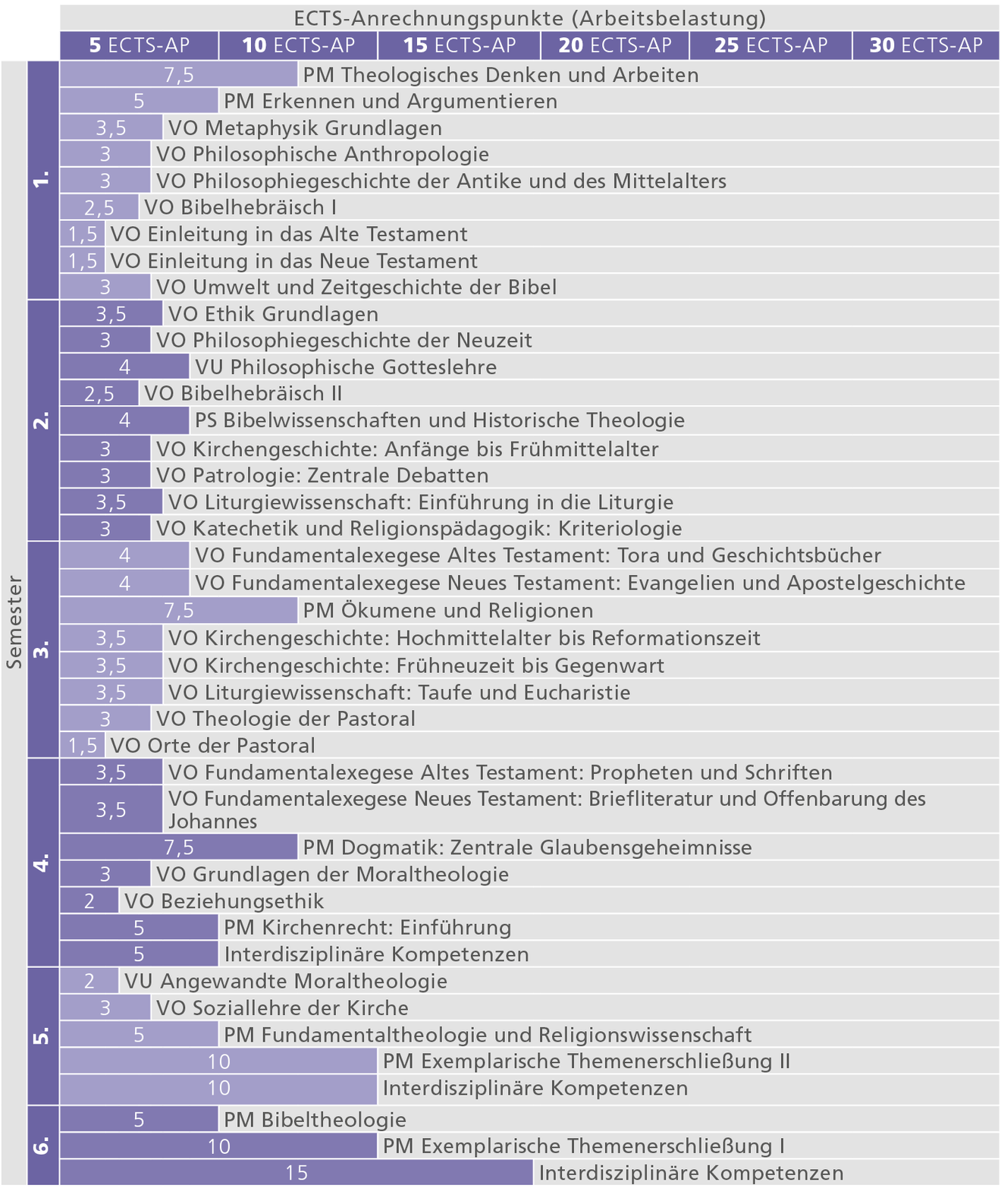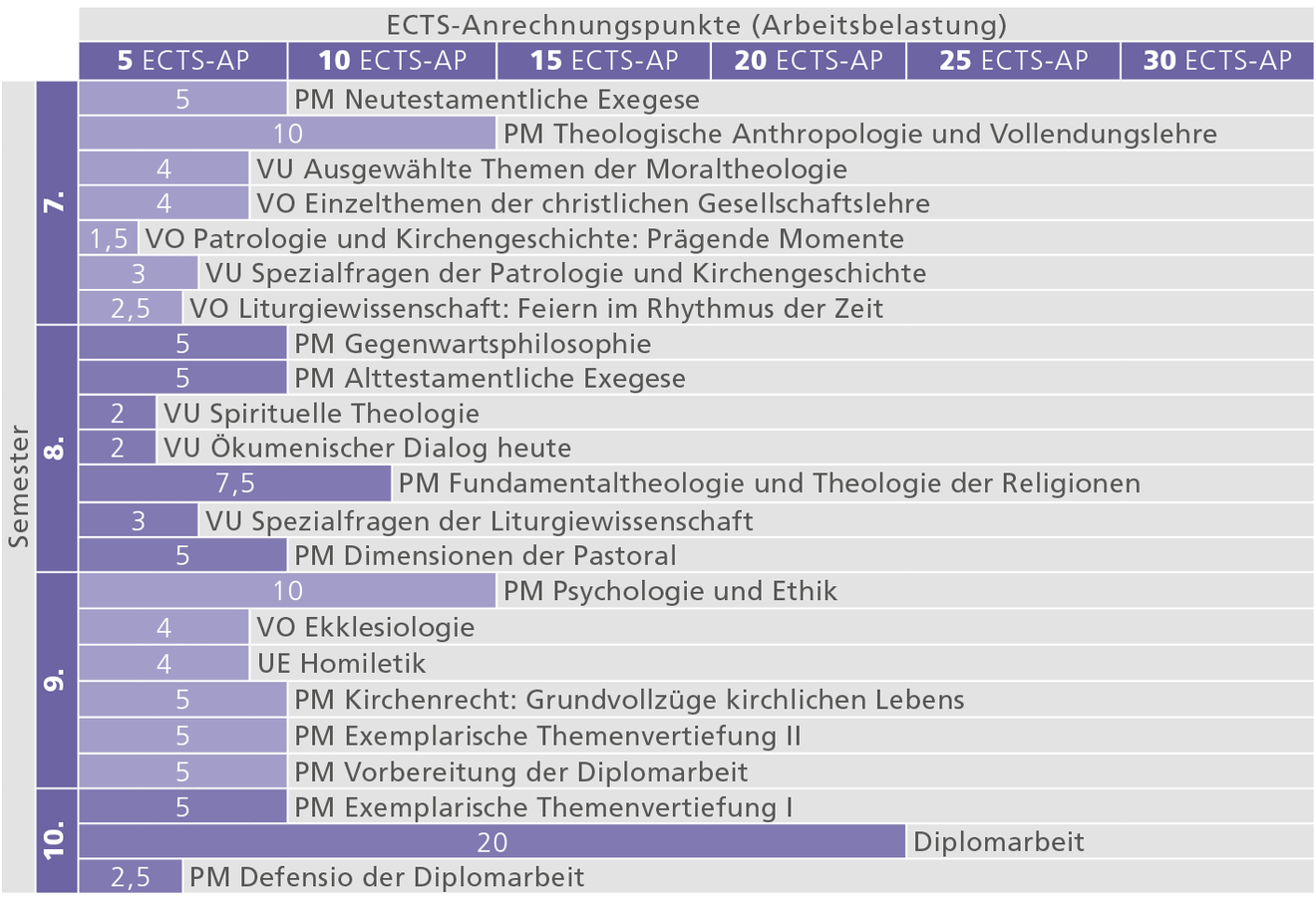Diplomstudium Katholische Fachtheologie
Curriculum (2021W)
Magistra/Magister der Theologie (Mag.theol.)
Dauer/ECTS-AP
10 Semester / 300 ECTS-AP
Studienart
Vollzeit
Unterrichtssprache
Deutsch
Voraussetzung
Matura/Äquivalentes Zeugnis und Sprachnachweis
Fakultät
Katholisch-Theologische Fakultät
ISCED-F
0221 Religion und Theologie
Studienkennzahl
UC 011
Zusatzprüfung
Die Zusatzprüfung aus Latein ist bis zur vollständigen Ablegung der ersten Diplomprüfung abzulegen, wenn dieses Fach nicht an einer höheren Schule im Ausmaß von mindestens 10 Wochenstunden erfolgreich absolviert wurde. Die Zusatzprüfung aus Griechisch ist bis zur vollständigen Ablegung der ersten Diplomprüfung abzulegen, wenn dieses Fach nicht nach der 8. Schulstufe an einer höheren Schule (an der Oberstufe) im Ausmaß von mindestens 10 Wochenstunden erfolgreich absolviert wurde. Beachten Sie, dass diese Zusatzprüfungen nicht die letzten Prüfung des Studiums sein dürfen.
Das Curriculum ist die Grundlage eines Studiums. Mit einem Blick auf das Curriculum zum Diplomstudium Katholische Fachtheologie erhältst du einen detaillierten Überblick zu Aufbau, Inhalt, Prüfungsordnung und Qualifikationsprofil dieses Diplomstudiums.
Durch das Curriculum können mehrere wichtige Fragen bereits vor Studienbeginn geklärt werden. Zum Beispiel welche Kriterien für die Anmeldung zum Diplomstudium Katholische Fachtheologie erfüllt werden müssen, wie lange das Studium dauert, welche Module zu absolvieren sind und vieles mehr.
Für das Diplomstudium Katholische Fachtheologie gilt aktuell das Curriculum 2021W.
Informationen zum Curriculum (2021W)
Die Gesamtfassung des Curriculums spiegelt das aktuell gültige Curriculum wider, ist rechtlich unverbindlich und dient lediglich der Information. Die rechtlich verbindliche Form des Curriculums inkl. etwaiger Änderungen finden Sie in den entsprechenden Mitteilungsblättern.
Die Information, welche Curriculumsversion für Sie gilt, entnehmen Sie bitte Ihrem Studienblatt
abrufbar unter: https://lfuonline.uibk.ac.at/public/lfuonline_meinestudien.studienblatt
Spalte: Curriculum in der geltenden Fassung
- Mitteilungsblatt vom 28.06.2023, 53. Stück, Nr. 621 (Änderung des Curriculum)
- Curriculum/Gesamtfassung (ab 01.10.2021)
- Mitteilungsblatt vom 15.09.2021, 104. Stück, Nr. 1052 (Berichtigung des Curriculums)
- Mitteilungsblatt vom 23.06.2021, 83. Stück, Nr. 883
Studieneingangs- und Orientierungsphase
(1) Im Rahmen der Studieneingangs- und Orientierungsphase, die im ersten Semester stattfindet, sind folgende Lehrveranstaltungsprüfungen abzulegen:
1. VO Einführung in den Glauben der Kirche (PM 1 lit. a, 2 SSt, 3 ECTS-AP),
2. VO Metaphysik Grundlagen (PM 3 lit. a, 2 SSt, 3,5 ECTS-AP),
3. VO Allgemeine Sakramententheologie (PM 1 lit. c, 1 SSt, 2,5 ECTS-AP),
4. VO Critical Thinking (PM 2 lit. a, 1 SSt, 1,5 ECTS-AP).
(2) Der positive Erfolg bei allen Prüfungen der Studieneingangs- und Orientierungsphase berechtigt zur Absolvierung der weiteren Lehrveranstaltungen und Prüfungen.
(3) Vor der vollständigen Absolvierung der Studieneingangs- und Orientierungsphase können Lehrveranstaltungen des ersten Studienabschnitts im Ausmaß von 19,5 ECTS-AP absolviert werden. Im Curriculum festgelegte Anmeldungsvoraussetzungen sind einzuhalten.
Empfohlener Studienverlauf
1. Studienabschitt:
7,5 ECTS-AP: PM Theologisches Denken und Arbeiten
5,0 ECTS-AP: PM Erkennen und Argumentieren
3,5 ECTS-AP: VO Metaphysik Grundlagen
3,0 ECTS-AP: VO Philosophische Anthropologie
3,0 ECTS-AP: VO Philosophiegeschichte der Antike und des Mittelalters
2,5 ECTS-AP: VO Bibelhebräisch I
1,5 ECTS-AP: VO Einleitung in das Alte Testament
1,5 ECTS-AP: VO Einleitung in das Neue Testament
3,0 ECTS-AP: VO Umwelt und Zeitgeschichte der Bibel
3,5 ECTS-AP: VO Ethik Grundlagen
3,0 ECTS-AP: VO Philosophiegeschichte der Neuzeit
4,0 ECTS-AP: VU Philosophische Gotteslehre
2,5 ECTS-AP: VO Bibelhebräisch II
4,0 ECTS-AP: PS Bibelwissenschaften und Historische Theologie
3,0 ECTS-AP: VO Kirchengeschichte: Anfänge bis Frühmittelalter
3,0 ECTS-AP: VO Patrologie: Zentrale Debatten
3,5 ECTS-AP: VO Liturgiewissenschaft: Einführung in die Liturgie
3,0 ECTS-AP: VO Katechetik und Religionspädagogik: Kriteriologie
4,0 ECTS-AP: VO Fundamentalexegese Altes Testament: Tora und Geschichtsbücher
4,0 ECTS-AP: VO Fundamentalexegese Neues Testament: Evangelien und Apostelgeschichte
7,5 ECTS-AP: PM Ökumene und Religionen
3,5 ECTS-AP: VO Kirchengeschichte: Hochmittelalter bis Reformationszeit
3,5 ECTS-AP: VO Kirchengeschichte: Frühneuzeit bis Gegenwart
3,5 ECTS-AP: VO Liturgiewissenschaft: Taufe und Eucharistie
3,0 ECTS-AP: VO Theologie der Pastoral
1,5 ECTS-AP: VO Orte der Pastoral
3,5 ECTS-AP: VO Fundamentalexegese Altes Testament: Propheten und Schriften
3,5 ECTS-AP: VO Fundamentalexegese Neues Testament: Briefliteratur u. Offenbarung des Johannes
7,5 ECTS-AP: PM Dogmatik: Zentrale Glaubensgeheimnisse
3,0 ECTS-AP: VO Grundlagen der Moraltheologie
2,0 ECTS-AP: VO Beziehungsethik
5,0 ECTS-AP: PM Kirchenrecht: Einführung
5,0 ECTS-AP: Interdisziplinäre Kompetenzen
2,0 ECTS-AP: VU Angewandte Moraltheologie
3,0 ECTS-AP: VO Soziallehre der Kirche
5,0 ECTS-AP: PM Fundamentaltheologie und Religionswissenschaft
10,0 ECTS-AP: PM Exemplarische Themenerschließung II
10,0 ECTS-AP: Interdisziplinäre Kompetenzen
5,0 ECTS-AP: PM Bibeltheologie
10,0 ECTS-AP: PM Exemplarische Themenerschließung I
15,0 ECTS-AP: Interdisziplinäre Kompetenzen
2. Studienabschnitt:
5,0 ECTS-AP: PM Neutestamentliche Exegese
10,0 ECTS-AP: PM Theologische Anthropologie und Vollendungslehre
4,0 ECTS-AP: VU Ausgewählte Themen der Moraltheologie
4,0 ECTS-AP: VO Einzelthemen der christlichen Gesellschaftslehre
1,5 ECTS-AP: VO Patrologie und Kirchengeschichte: Prägende Momente
3,0 ECTS-AP: VU Spezialfragen der Patrologie und Kirchengeschichte
2,5 ECTS-AP: VO Liturgiewissenschaft: Feiern im Rhythmus der Zeit
5,0 ECTS-AP: PM Gegenwartsphilosophie
5,0 ECTS-AP: PM Alttestamentliche Exegese
2,0 ECTS-AP: VU Spirituelle Theologie
2,0 ECTS-AP: VU Ökumenischer Dialog heute
7,5 ECTS-AP: PM Fundamentaltheologie und Theologie der Religionen
3,0 ECTS-AP: VU Spezialfragen der Liturgiewissenschaft
5,0 ECTS-AP: PM Dimensionen der Pastoral
10,0 ECTS-AP: PM Psychologie und Ethik
4,0 ECTS-AP: VO Ekklesiologie
4,0 ECTS-AP: UE Homiletik
5,0 ECTS-AP: PM Kirchenrecht: Grundvollzüge kirchlichen Lebens
5,0 ECTS-AP: PM Exemplarische Themenvertiefung II
5,0 ECTS-AP: PM Vorbereitung der Diplomarbeit
5,0 ECTS-AP: PM Exemplarische Themenvertiefung I
20,0 ECTS-AP: Diplomarbeit
2,5 ECTS-AP: PM Defensio der Diplomarbeit
1. Studienabschitt:

2. Studienabschitt:

| Semester | ECTS-AP | Titel |
|---|---|---|
Wahlpaket
Im Rahmen des Diplomstudiums kann ein Wahlpaket im Umfang von 30 ECTS-AP absolviert werden.
Weiterführende Informationen bzw. eine Liste möglicher Wahlpakete sind abrufbar unter:
https://www.uibk.ac.at/studium/angebot/wahlpakete/
Erweiterung des Studiums
Im Rahmen dieses Studiums kann das Erweiterungsstudium Entrepreneurship im Umfang von 45 ECTS-AP absolviert werden. Die Zulassung zur Erweiterung setzt die Zulassung zu einem oder den bereits erfolgten Abschluss eines ausgewählten Studiums voraus. Weitere Informationen sind abrufbar unter: https://www.uibk.ac.at/studium/angebot/es-entrepreneurship
Termine
Defensiotermine
Wintersemester 2023/2024:
Di, 03. Oktober 2023 (Anmeldeschluss: Di, 12. September 2023)
Di, 24. Oktober 2023 (Anmeldeschluss: Di, 03. Oktober 2023)
Di, 30. Jänner 2024 (Anmeldeschluss: Di, 09. Jänner 2024)
Sommersemester 2024
Di, 5. März 2024 (Anmeldeschluss: Di, 13. Februar 2024)
Di, 19. März 2024 (Anmeldeschluss: Di, 27. Februar 2024)
Di, 25. Juni 2024 (Anmeldeschluss: Di, 4. Juni 2024)
Wintersemester 2024/25
Di, 8. Oktober 2024 (Anmeldeschluss: Di, 17. September 2024)
Di, 22. Oktober 2024 (Anmeldeschluss: Di, 1. Oktober 2024)
Di, 28. Jänner 2025 (Anmeldeschluss: Di, 7. Jänner 2025)
Sommersemester 2025
Di, 4. März 2025 (Anmeldeschluss: Di, 11. Februar 2025)
Di, 25. März 2025 (Anmeldeschluss: Di, 4. März 2025)
Di, 24. Juni 2025 (Anmeldeschluss: Di, 3. Juni 2025)
Informationen zur Prüfungsordnung inkl. Bewertung und Benotung
Prüfungsordnung
Die Prüfungsordnung ist integraler Bestandteil des Curriculums, detaillierte Informationen finden Sie unter dem Paragrafen Prüfungsordnung.
Bei der Notenverteilungsskala handelt es sich um die statistische Darstellung der Verteilung aller positiv absolvierten Prüfungen, die innerhalb eines Studiums bzw. eines Studienfaches (unter Heranziehung aller gemeldeten Studierenden eines Studiums bzw. eines Studienfaches) erfasst wurden. Die Notenverteilungsskala wird in regelmäßigen Abständen aktualisiert.
| Österreichische Notenskala | Definition | %-Satz | ||
| 1 | SEHR GUT | 56,5 | = 100% | |
| 2 | GUT | 27,2 | ||
| 3 | BEFRIEDIGEND | 11,2 | ||
| 4 | GENÜGEND | 5,1 | ||
| 5 | NICHT GENÜGEND |
März 2025
Gesamtbeurteilung der Qualifikation
Nicht zutreffend
Erklärung: Eine Gesamtbeurteilung (mit Auszeichnung bestanden, bestanden, nicht bestanden) wird nur über eine studienabschließende Prüfung, die aus mehr als einem Fach besteht, vergeben (im Curriculum dieses Studiums ist diese nicht vorgesehen).
Formulare
- Prüfungsprotokoll (Erste Diplomprüfung)
- Prüfungsprotokoll (Zweite Diplomprüfung)
- Anmeldung der Diplomarbeit
- Beurteilung des Pflichtmoduls: Vorbereitung Diplomarbeit
- Ansuchen um Anerkennung von PrüfungenUND Beiblatt
ACHTUNG: Füllen Sie bitte das Formular "Ansuchen um Anerkennung von Prüfungen" UND das "Beiblatt Katholische Fachtheologie" aus! - Deckblatt der Diplomarbeit
- Antrag um Zulassung zur dritten und vierten Wiederholung einer Lehrveranstaltungsprüfung
Formulare und Ablauf der Einreichung der Diplomarbeit (gültig seit 01.11.2023)
Kontakt und Information
Prüfungsreferat
Standort Universitätsstraße 15
Studiendekan
Priv.-Doz. Dr. Liborius Olaf Lumma
Informationen zum Studium
Richtlinien zur elektronischen Einreichung und Veröffentlichung von wissenschaftlichen Arbeiten und Merkblatt der ULB
